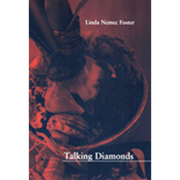Book review of Talking Diamonds
A review of Talking Diamonds, Linda Nemec Foster’s new collection of poems.
By Oriana Ivy
The typical poem in this beautiful collection by Linda Nemec Foster, her eighth book, is quiet, elegant, and wise. These poems do not shout; they whisper – about aging and dying, a mother’s frightful dementia (the mother no longer recognizes her daughter and calls her “Mom”), deformed children who are nevertheless a gift, and dead stars whose light still travels to us. They are filled with small, uncanny observations, for instance the demented mother saying “What a glorious burden” to the living room wall.
It is the poet’s gift of compassion that makes such poems not only bearable, but a pleasure to read. For instance, we learn that the mother’s own mother died when her daughter was only fifteen.
But me, I heard my mother calling
my name every day long after
we buried her . . . Always
the same voice from that dark place.
`Helen, Helen.’ Her voice so clear
as if she was in the basement
calling me down to help her fold
clean, white sheets.
This is heartbreak presented in the most intimate, quiet voice. In a later poem, just as quietly, we are told her mother was conceived to take the place of two daughters who previously died. It’s all muted colors and gray sky. A new kind of trinity presides over this volume: Mother, Daughter, and the Spirit “where everything begins and nothing ends.”
Linda Nemec Foster’s other great gift is her sensitivity to the astonishing in unlikely settings.
. . . nothing prepares you for this vision:
Our Lady of Guadalupe on Waikiki.
A blue ocean away from where she
first appeared to that dirt-poor
Indian peasant on Tepeyac Hill,
you can’t miss her shape of glorious
colors coming toward you: deep teal,
bright vermilion, bronzed gold tattooed
on the chest of a huge Mexican from Baja.
Even his back is emblazoned with her back
and you’re stunned by the accuracy
of detail; the little angel at her feet
holding a sliver of the crescent moon
as if she were a living, breathing icon.
. . .
This ocean, this beach at your feet
as if she were Boticelli’s Venus
washed ashore with the sea foam,
washed ashore for your approval.
And you tell yourself this isn’t a miracle,
only a tattoo; this isn’t anything
extraordinary, only your life
Here is a poet who is always prepared for miracles, and who recognizes the deep affinity between Venus on her shell and Our Lady on the Crescent, typical of the icons of the Black Madonna. In another unforgettable poem, “The Blind and the Lame Swim at the Y,” the transformation is even more startling:
But it’s the crippled girl
with a slash for a mouth
that amazes the water. Tiny
deformed feet that curl
like tender shells forgotten
on some deserted beach,
become the shining, sleek fins
of a mermaid’s tail.
The poem ends with a stanza of skillfully wrought wisdom: mothers will accept their handicapped children “without regret” –
Because the secret heart of every
fairy tale is locked deep within
these children. Because this heart
beats in goodness which is rarer
than perfection. Because this heart
is like water: uncaring yet
kind, transparent yet full.
Among my favorite poems is “Red Amaryllis, 1937,” honoring an art lover, a man who even in a strip joint behaves in a courtly manner:
When a black girl
with erect nipples came to dance inches from your face,
you stood up, took her hand, and began to waltz.
. . . After the waltz, you kissed her hand.
She said her name was Jasmine. Flower of night air
and moonlight, you replied.
Another favorite is “The Nature of the Beast,” with these lines about a cat bringing its offering of a nestling it killed:
But remember how it holds the gift
tenderly in its mouth, approaching
you like a child, a lover who wants
to give you the gift of its wildness.
Poetry is not the things themselves, it is in how we respond to them – quietly, lovingly, without judgment or bitterness, only with compassion and understanding, Linda Nemec Foster teaches us. In spite of heartbreak, there is beauty and grace in life. Everything can be transformed, transfigured into brilliance. In the title poem of the collection, she imagines diamonds talking
about their lives underground.
Never are they bitter or angry. Nor do they
even curse those dark
memories of suffocating black. They know
every facet of their brilliance began as mere
coal – a mere dark fist waiting
for a chance to be something
other than ordinary.
But then it turns out that nothing is merely ordinary. Simply to wake up to another day is already extraordinary, if we have the eyes to see. Linda Nemec Foster certainly has the eyes that are always ready for miracles, and the words with which to describe them. Through her, we see that life is indeed a glorious burden – with equal emphasis on “burden” and “glorious.”
____________________
The book is available from Amazon and New Issues Press. To see more about Linda Nemec Foster, I encourage readers to checkout her website.
Poet Oriana Ivy blogs about poetry at Oriana-Poetry. Her translations of Zbigniew Herbert are available at Scream Online. Some of her poems are also available. online. A powerful sequence about her Polish grandmother appears here. Her poem “My America” about discovering America for herself is available at her blog.
Originally Published by Writing the Polish Diaspora, click here to view article.


